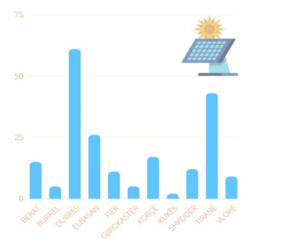By Esmeralda Topi – October 11, 2022
From the beginning of next year, businesses that have installed photovoltaic plants for their own consumption will be required to submit annual and not monthly balances, as they currently do. With this scheme, a business company that has installed solar panels for self-consumption can receive the excess energy it produces in the summer in winter, or vice-versa. The Ministry of Energy accepted the request to change the scheme, almost a year after the interest groups presented it, at a time the provision of electricity has become a challenge due to the high costs brought about by the global crisis.
“This is a problem we can address and we can apply the net annual financial tables.” – declared the Minister of Infrastructure and Energy Belinda Balluku on September 16, 2022, leaving open the possibility of meeting one of the main needs that producers of photovoltaic energy addressed to the government almost a year ago.
In November 2021, the solar energy producers addressed a long list of demands to the government, which included the introduction of an annual net balance. The working group, which was set up to evaluate these requests, took almost a year to accept the change of the net energy balance scheme, from monthly to annual.
In a meeting with representatives of business organizations and the Chamber of Commerce and Industry, Minister Balluku said:
“Starting from January 1, 2023, based on all the legal changes that we will address, we will have an annual energy production netting and this is a step forward.”
In other words, a business that has solar panels installed for self-production can receive the energy it produces in the summer and in the winter or vice versa.
“A plant with 100 kwh of energy produces 200 kwh in summer and 50 kwh in winter. Currently, if within the month of June, which is the peak, you produce 30% more than you need, the energy goes to waste, and the state will not recognize it. While in the winter, when you produce 70% less than you need, you will pay for it.” – explains to Faktoje Alban Zusi, Chairman of the Association of Exporters, adding that he himself has invested in solar panels in his businesses. With the change of the scheme, Zusi says that he will increase the capacity, as he finds it useful for the progress of his business.
“I only invested to produce 40% of the energy I need, because if I produced more, the state would take it and not pay me for it. So, instead of having my investment return in four years, I would have it in six. Now I will go invest so I can produce 100% of the energy I need. So, even if I produce more than I need in the summer, it goes to the grid, and the government can return it to me in the winter. Or maybe the Government pays at summer price, but at least it is not wasted.” – emphasizes Zusi.
In addition to businesses producing their own energy, the changing of the netting frequency from monthly to annual has also been constantly requested by companies that sell and install panels. Anduel Çekrezi, the representative of “Euroelektra”, a company involved in developing photovoltaic projects, says that the change of the scheme will further promote investments in this field, as the return on the investment becomes faster.
“The change of the net scheme from monthly to annual for companies producing their own energy would be a very good and proper step for this category, as their excess production is currently not recognized to them, especially during the summer months.” – he adds for Faktoje.
Rako Paja, the Administrator of ‘AR Ecoenergjia’ shares the same argument.
“The interest in installing photovoltaic plants has doubled, driven by the energy crisis, but also by developments in the domestic market where businesses in the free market are buying energy at prices several times higher than before. Introducing an annual netting scheme is a great incentive to invest in this direction, not only for businesses, but also by families.” – emphasizes Paja for Faktoje.
In its 2021 annual report , the Energy Regulatory Authority reported that companies producing energy for their consumption, which are connected to the power grid, covered a quarter of their electricity consumption themselves, through solar panels.
“From the collected data, it results that, during 2021, companies producing energy for their own consumption generated a total of about 2,674,615 KW during the first eight months of 2021. The energy supplied by the Universal Service Provider (FSHU) to these companies, for the same period, is 7,738,233 KW,” notes the report.
Currently, Durrës, Tirana and Elbasan are the areas with the biggest number of photovoltaic units installed for self-production, but the change in the scheme paves the way for the number to increase throughout the country.

(Energy Regulatory Authority, Report 2021)
Main picture taken from the web.






